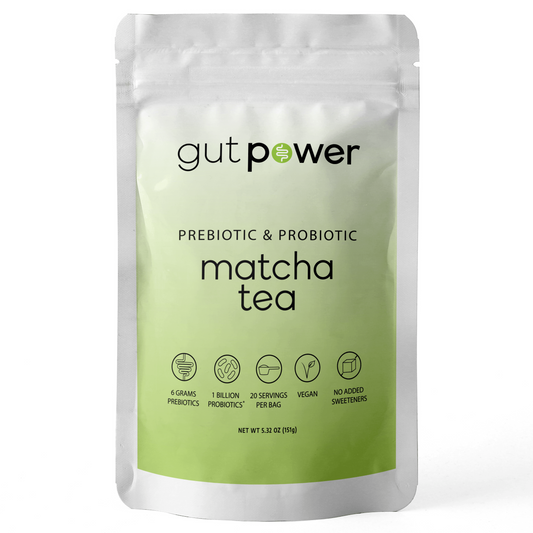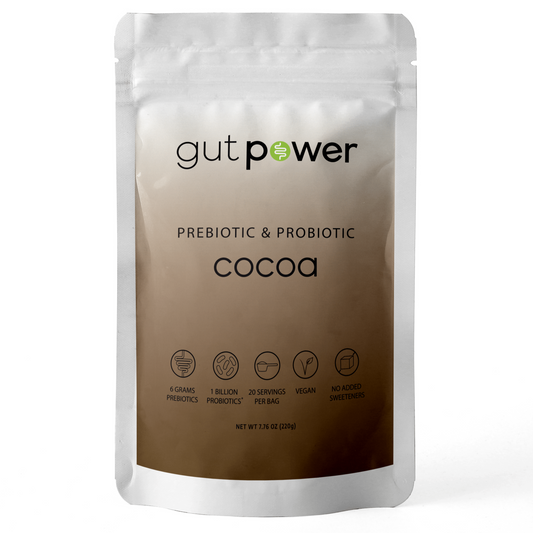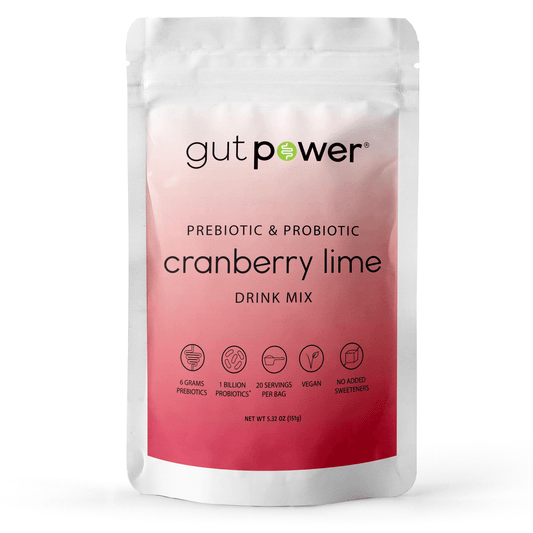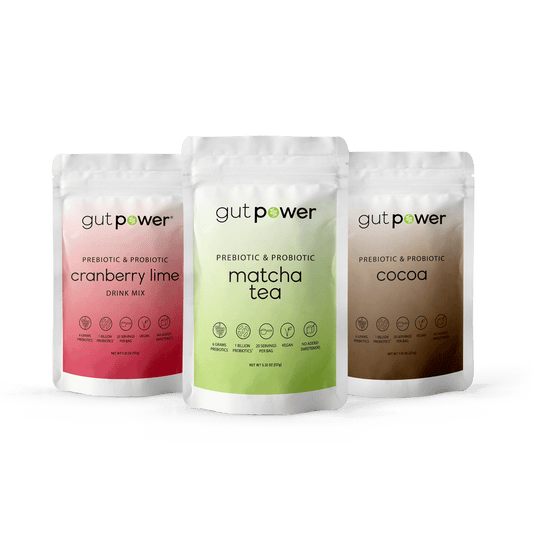Eating a high-fiber diet can be difficult – but there are plenty of high-fiber supplements, foods, and snacks to help. In this article, we'll go over your options, including fiber powder supplements for those who don't like pills!
Today we’ll discuss fiber’s role in gut health and beyond, plus share easy ways to incorporate it into your diet and reap the benefits.
What is Fiber?
Fiber is essentially the indigestible part of the plant material we eat.
You see, your body only has the ability to break down certain kinds of carbohydrates (or sugars) to use for fuel.
Plants frequently contain carbohydrates that cannot be broken down by your digestive enzymes and will pass through to the gut where they are either broken down by intestinal bacteria or moved along intact to become part of your fecal matter (yup – we’re talking poop). (1)
Soluble vs. Insoluble Fiber
The classification of fiber itself can be further broken down into 2 categories: soluble vs. insoluble fiber.
Like the names suggest, soluble fiber can be dissolved in water, whereas insoluble cannot. Both are important for your health and they’re often found together in fruits and vegetables. (2) Let’s discuss them in more detail!
Soluble Fiber: Metabolized by Gut Bacteria
When fiber reaches your gut, some of it (mostly soluble fiber) is broken down or metabolized by bacteria. (1)
By-products of this metabolic process – like short-chain fatty acids (SCFAs) – are highly beneficial to the body. Research suggests that SCFAs are involved in maintaining proper immune regulation, a healthy metabolism, and a happy brain. (3, 4, 5)
In addition to this, soluble fiber helps to “feed” your healthy gut bacteria during this metabolic process. This means that soluble fiber acts as a prebiotic, promoting the growth of probiotics. (1)
Insoluble Fiber: Not Metabolized by Gut Bacteria
In contrast to soluble fiber, fiber that cannot be broken down by your body nor your microflora is considered to be insoluble. (1)
Though destined to make an undignified exit out of your large intestine, it plays an important role in providing bulk to your feces, making them easier to pass. In addition to this, insoluble fiber helps to attract water into the large intestine, which helps to soften stool – again, making it easier to pass.
Insoluble fiber has long been the more “famous” of the two fibers, but it also tends to comes with a cost of digestive upset when consumed in large amounts.
Does Fiber Make You Poop?
Now that we’ve discussed the two kinds of fiber in more detail, you might be wondering...does fiber make you poop?
And the answer is: yes, fiber makes you poop! Consuming a high-fiber diet is a great way to ensure healthy bowel movements.
That said, there is such thing as too much fiber, and it’s important to work your way up to a high-fiber diet slowly to mitigate the risk of digestive upset.
Fiber Benefits: How Consuming More Fiber is Beneficial for Your Health
Research suggests that fiber is a powerhouse when it comes to benefiting your health.
Benefits of Fiber:
- Helps maintain healthy body weight.
- Decreases “bad” cholesterol levels and reduces the risk of cardiovascular disease.
- Regulates blood sugar levels and reduces the risk of diabetes.
- Decreases the risk of colorectal cancers.
- Improves mental health status.
- Reduces chronic inflammation.
Researchers believe that much of these benefits stem from the effect a high fiber diet has on your gut microbiome – pretty neat!
How Much Fiber Per Day is Best? Men vs. Women
Clearly, evidence suggests fiber is beneficial for your health. But just how much fiber per day is best?
While each person’s individual fiber requirements will differ, the below information can provide a starting point when considering how much fiber to consumer per day:
|
50 Years Old and Under |
51+ Years Old |
|
|
Female |
25g |
21g |
|
Male |
38g |
30g |
Mayo Clinic (Institute of Medicine)
High Fiber Foods and Snacks
There are plenty of foods and snacks you can consume to meet your fiber goals. Let’s go over the different high-fiber foods out there!
High Fiber Foods (Insoluble):
- Whole-wheat grains
- Beans
- Nuts
High Fiber Foods (Soluble):
- Peas and other legumes
- Fruits (like apples, citrus)
- Vegetables (like carrots)
- Oats
Remember that most high-fiber foods contain a mix of both insoluble and soluble fiber.
Fiber Powder Supplements
If it’s looking like you may fall short of your fiber goals, fear not! There are a multitude of fiber supplements out there to choose from. But how do you choose the best fiber supplement for you?
First, it’s a good idea to get your fiber in powder form. While there are fiber pill supplements on the market, it’s difficult to get a meaningful amount of fiber from them (it would mean taking a lot of pills!).
A fiber powder supplement provides an easy way to consume additional fiber. Many of the fiber supplements available mix into water or juice.
One of the problems with fiber supplements, however, is that they often come along with some digestive discomfort (after all, they are highly concentrated forms of fiber – it can be a lot for your system to handle!).
If you’re looking for a fiber powder supplement that’s easy on your digestive system, Gut Power® may be a great choice for you.
Gut Power® contains a gentle, but powerful prebiotic fiber called Sunfiber®. Sunfiber® is derived from the guar bean and provides all the benefits of fiber while being gentle on sensitive guts, sparing you the gas and bloating that can often go hand in hand with an increase in fiber.
The Bottom Line: Increasing Fiber Intake is Beneficial for Your Health
More fiber in your diet makes for a healthier you. Increasing your fiber intake may help to improve your overall health by making it easier to stay at a healthy weight, reducing your risk of cardiovascular disease, improving your metabolism, and reducing inflammation.
A high fiber diet can sometimes be difficult to achieve, though. Getting most of your fiber from whole foods is preferable, but if you need a fiber powder supplement to reach your goals, that’s ok too!





